|
|
|
Sort Order |
|
|
|
Items / Page
|
|
|
|
|
|
|
| Srl | Item |
| 1 |
ID:
164968
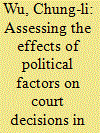

|
|
|
|
|
| Summary/Abstract |
Using panel data on Taiwan district court verdicts from 2000 through 2015, this study examines the impact of resource inequality on corruption litigation to determine whether court decisions are politically biased. Contrary to expectations, it appears that superior resources give defendants only a limited advantage in corruption trials in Taiwan.
|
|
|
|
|
|
|
|
|
|
|
|
|
|
|
|
| 2 |
ID:
089389
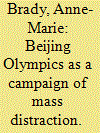

|
|
|
|
|
| Publication |
2009.
|
| Summary/Abstract |
From 2006 to 2008 the predominant theme in the Chinese media was preparations for the 2008 Olympics. These preparations were not merely about putting up new sports stadiums; China also underwent a massive public etiquette campaign, aimed at "civilizing" Chinese citizens. This was nominally so they could be good hosts during the Beijing Olympics. The 2006-08 emphasis on Olympic-related news coverage and the ongoing public morals campaign was what I have called a campaign of mass distraction: a propaganda campaign designed to mobilize the population around a common goal, and distract them from more troubling issues such as inflation, unemployment, political corruption and environmental degradation. This article discusses China's Olympics propaganda within the context of the modernization of the Chinese Communist Party's propaganda system - which has included incorporating practices originating in modern democratic states - and considers in what way changes in the propaganda system reflect changes in China's system of political control.
|
|
|
|
|
|
|
|
|
|
|
|
|
|
|
|
| 3 |
ID:
139297
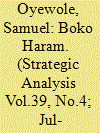

|
|
|
|
|
| Summary/Abstract |
The Boko Haram insurgency has emerged as one of the greatest threats to human security in Africa, and the Lake Chad region in particular. This is a region with a total area of 427,500 km2, which covers/ Cameroon, Chad, Niger and Nigeria. The movement known as Boko Haram (Western education is forbidden) originated in Nigeria in 2002. The official name of the movement is Jama’atu Ahlis Suna Lidda’awati Wal Jihad (People Committed to the Propagation of the Prophet’s Teachings and Jihad). The group was formed on the charismatic preaching of Yusuf Muhammad, which attracted hundreds of thousands of followers across northern Nigeria, Cameroon, Niger and Chad. The group’s campaign is informed by Islamic revivalism, widespread poverty, political corruption, repression and a weak justice system in the region.
|
|
|
|
|
|
|
|
|
|
|
|
|
|
|
|
| 4 |
ID:
139298
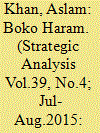

|
|
|
|
|
| Summary/Abstract |
Nigeria is currently going through a very delicate phase. The kidnapping of more than 275 Chibok schoolgirls by the terrorist organisation Boko Haram shocked not only Nigeria but the international community at large. This act by Boko Haram was widely criticised and led to worldwide condemnation and an international rescue effort. More seriously, the group leader Shekhau threatened to sell the girls into slavery and used Islamic teachings as justification.
|
|
|
|
|
|
|
|
|
|
|
|
|
|
|
|
| 5 |
ID:
130024
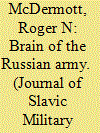

|
|
|
|
|
| Publication |
2014.
|
| Summary/Abstract |
Following the Russia-Georgia War in August 2008, Russia's conventional Armed Forces were subjected to a far reaching and unpredictable reform. Although the Armed Forces were long overdue reform, previous efforts rapidly failed for a variety of reasons including institutional inertia, in-fighting within the military elite and a lack of consensus on the goals and targets of such reform. The reforms of 2008-12 were therefore unprecedented since the creation of Russia's Armed Forces in 1992 following the disintegration of the USSR in late 1991; major changes were actually implemented. Yet, the reforms that followed were haphazard, poorly implemented and frequently experienced setbacks, reversals and an overall lack of coordinated policy efforts. These issues are examined in the following paper, exploring the roots of Russian defense planning weaknesses, and the numerous policy zigzags of the reforms to the structure of the Armed Forces, officer downsizing, NCO development and many other issues within a political-military culture that actually mitigates time-phased and fully worked-out planning cycles. Moscow's blindness to the utility of reliable military statistics will ensure continued 'blind planning' and institutional guesswork until obsessive secrecy and state level corruption give way to more scientific approaches to forming, implementing and managing such strategic level change within the country's defense and security structures.
|
|
|
|
|
|
|
|
|
|
|
|
|
|
|
|
| 6 |
ID:
087568
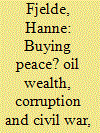

|
|
|
|
|
| Publication |
2009.
|
| Summary/Abstract |
This article argues that, contrary to received wisdom, political corruption is not necessarily associated with a higher risk of civil war in oil-rich states. Political corruption can be used to accommodate opposition and placate restive groups by offering private privilege in exchange for political loyalty. Since oil wealth is associated with large rents accruing in state treasuries, it provides an economic foundation for such clientelist rule. This article thus argues that oil-rich governments can use political corruption to buy support from key segments of society, effectively outspending other entrepreneurs of violence. Based on a logit analysis of civil war onsets, 1985-99, the article finds support for this `co-optation argument'. A negative and statistically significant interaction term between oil production and political corruption is consistent across different models and robust to a number of specifications. While both variables per se increase the risk of conflict overall, higher levels of corruption seem to weaken the harmful impact of oil on the risk of civil war. This finding suggests the need for a more nuanced understanding of the relationship between natural resource wealth, governance and armed conflict. Political corruption has prolonged poverty and bred economic and political inequality in many oil-rich states, but it has also helped cement powerful alliances with a stake in the continuation of the corrupt regimes.
|
|
|
|
|
|
|
|
|
|
|
|
|
|
|
|
| 7 |
ID:
089489
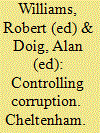

|
|
|
|
|
| Publication |
Cheltenham, Edward Elgar publishing ltd., 2000.
|
| Description |
xvii, 631 p. : ill.
|
| Series |
The politics of corruption ; 4
|
| Contents |
Includes bibliographical references and index.
|
| Standard Number |
1840644923
|
|
|
|
|
|
|
|
|
|
|
|
Copies: C:1/I:0,R:0,Q:0
Circulation
| Accession# | Call# | Current Location | Status | Policy | Location |
| 044756 | 364.1323/WIL 044756 | Main | On Shelf | General | |
|
|
|
|
| 8 |
ID:
089486
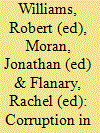

|
|
|
|
|
| Publication |
Cheltenham, Edward Elgar publishing ltd., 2000.
|
| Description |
xx, 611 p. : ill.
|
| Series |
The politics of corruption ; 3
|
| Contents |
Includes bibliographical references and index
|
| Standard Number |
1840644915
|
|
|
|
|
|
|
|
|
|
|
|
Copies: C:1/I:0,R:0,Q:0
Circulation
| Accession# | Call# | Current Location | Status | Policy | Location |
| 044755 | 364.1323/WIL 044755 | Main | On Shelf | General | |
|
|
|
|
| 9 |
ID:
089484
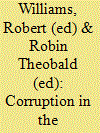

|
|
|
|
|
| Publication |
Cheltenham, Edward Elgar publishing ltd., 2000.
|
| Description |
xvi, 555 p.
|
| Series |
The politics of corruption ; 2
|
| Contents |
Includes bibliographical references and index.
|
| Standard Number |
1840644907
|
|
|
|
|
|
|
|
|
|
|
|
Copies: C:1/I:0,R:0,Q:0
Circulation
| Accession# | Call# | Current Location | Status | Policy | Location |
| 044754 | 364.1323/WIL 044754 | Main | On Shelf | General | |
|
|
|
|
| 10 |
ID:
093827
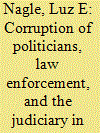

|
|
|
|
|
| Publication |
2010.
|
| Summary/Abstract |
Mexico is a failing state, languishing under a deeply entrenched system of political corruption that undermines the three branches of government and compromises Mexico's law enforcement and national security capabilities. This article explores the culture of corruption that pervades the state and frustrates the rule of law in Mexico, examining how the political elites, the judiciary, and police officials embrace corruption as a primary means for career advancement and for acquiring personal wealth. It is an examination of a country overwhelmed by a system of government and commerce that has grown dependent on corruption in order to function. But such a system cannot sustain itself indefinitely, and the signs of the Mexican state's collapse are becoming more apparent in the wake of unprecedented political and social violence at the hands of corrupt actors and Mexican drug lords.
|
|
|
|
|
|
|
|
|
|
|
|
|
|
|
|
| 11 |
ID:
122111
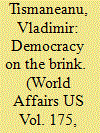

|
|
|
|
|
| Publication |
2013.
|
| Summary/Abstract |
Twenty-three years after the bloody uprising that freed it from the grip of the Ceausescu dictatorship, Romania seemed to have become a consolidated democracy, boasting membership in NATO and the European Union. Then came the summer of 2012, when the southeastern European country, already a cause of concern to Western Europe because of reports of creeping lawlessness and political corruption, tried on a more authoritarian political identity, as a second Belarus or a second Venezuela. Officials in the EU and US winced and unequivocally called upon the new Romanian government to abide by its commitments.
|
|
|
|
|
|
|
|
|
|
|
|
|
|
|
|
| 12 |
ID:
089482
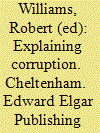

|
|
|
|
|
| Publication |
Cheltenham, Edward Elgar publishing ltd., 2000.
|
| Description |
xvi, 550 p. : ill.
|
| Series |
The politics of corruption; 1
|
| Contents |
Includes bibliographical references and index.
|
| Standard Number |
1840644893
|
|
|
|
|
|
|
|
|
|
|
|
Copies: C:1/I:0,R:0,Q:0
Circulation
| Accession# | Call# | Current Location | Status | Policy | Location |
| 044753 | 364.1323/WIL 044753 | Main | On Shelf | General | |
|
|
|
|
| 13 |
ID:
131063
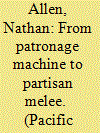

|
|
|
|
|
| Publication |
2014.
|
| Summary/Abstract |
The party system in Indonesia has expanded in the post-Suharto era. With each successive election, voters have spread their support across a wider array of parties. This has occurred despite deliberate institutional tweaks designed to consolidate the system by privileging large parties. Why has the party system expanded despite increasing institutional incentives to consolidate? This article places party system change in a broader context of decentralization and corruption. The decentralization and deconcentration of political power has opened multiple avenues for voters and elites to access state resources. Whereas major parties were expected to dominate resources in the immediate aftermath of the transition, changes to the formal and informal institutions eroded their control over the state. This has caused previously consolidated subnational party systems to fracture. The argument is demonstrated using narrative and newly constructed cross-district datasets. The paper develops the concept of rent opportunities, defined as the ability to access and abuse state resources. Party system expansion has been greatest in areas with high rent opportunities, where both voters and elites are Social Media Presidential Election Indonesia 2014 Indonesiaparticularly motivated by the competition for state resources. In these areas, characterized by large state sectors, the formerly authoritarian party (Golkar) initially won large electoral victories due, in part, to its control over patronage. As Golkar lost its ability to monopolize resources, the party system fractured. Voting for small parties surged and the party machine was replaced by a partisan melee. My argument exposes the limits of institutional engineering and underlines the formative role corruption has had on the evolution of Indonesia's party system.
|
|
|
|
|
|
|
|
|
|
|
|
|
|
|
|
| 14 |
ID:
122448
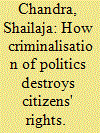

|
|
|
|
|
| Publication |
2013.
|
| Summary/Abstract |
Most of the corruption in developing countries is inherently
political…What is labeled as corruption in developing countries mirrors
the distribution of power within societies. Few anti-corruption
campaigns dare to attack the roots of corruption in such societies as
these roots lie in the distribution of power itself."
1
This paper examines discourses on the nature and extent of
corruption in India and two factors most responsible for it. The main
argument is that unaccounted wealth and the criminalisation of politics
are responsible for important decisions being influenced by extraneous
considerations. When criminal elements hold the reins of government
they show scant concern for citizens' rights; among these the violation
of human rights not only dispossesses those in greatest need but also
brings irreversible consequences that affect generations of citizens.
|
|
|
|
|
|
|
|
|
|
|
|
|
|
|
|
| 15 |
ID:
182785
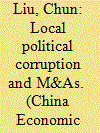

|
|
|
|
|
| Summary/Abstract |
We examine the relation between local political corruption and firms' cross-province M&As using provincial-level data on corruption in China. The results show that firms in more corrupt regions are less likely to engage in cross-province M&As. Further analyses reveal that the effects of local corruption on the probability of cross-province M&As are stronger when corrupt officers have greater impeding benefits or lower impeding costs. Meanwhile, Both ex-ante intervention and ex-post punishment are important channels through which corrupt officers hinder firms' cross-province M&As. Moreover, informal institutions, such as social capital and informal networks can help to alleviate the negative impact of political corruption on firms' cross-province M&As.Our findings show that in the context of highly government intervention, cross-province M&As not only cannot be an effective channel to shield from expropriation, but are themselves highly distorted and lead to significant economic efficiency losses.
|
|
|
|
|
|
|
|
|
|
|
|
|
|
|
|
| 16 |
ID:
050057
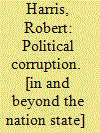

|
|
|
|
|
| Publication |
London, Routledge, 2003.
|
| Description |
xii, 246p.
|
| Standard Number |
0415235561
|
|
|
|
|
|
|
|
|
|
|
|
Copies: C:1/I:0,R:0,Q:0
Circulation
| Accession# | Call# | Current Location | Status | Policy | Location |
| 047465 | 364.1323/HAR 047465 | Main | On Shelf | General | |
|
|
|
|
| 17 |
ID:
131551
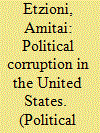

|
|
|
|
|
| Publication |
2014.
|
| Summary/Abstract |
To establish the scope and level of corruption in the contemporary United States, a collaborative project of political scientists is needed. Such a study should start with explicating the definition of corruption various scholars use. Three are noted here: using public goods for personal gains, deflecting public goods to private groups, and making such moves when these are legal although they are still illicit. To assess corruption on these levels, we must consider that various forms that "capture" takes beyond the corruption of the laws themselves. A study of the major differences in the level of corruption among the three branches of government may improve our understanding of the prevalence and causes of corruption. A study of "rent" may help predict that future course of corruption. Other topics whose study warrants collaborative investigation are listed.
|
|
|
|
|
|
|
|
|
|
|
|
|
|
|
|
| 18 |
ID:
131010
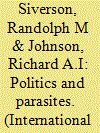

|
|
|
|
|
| Publication |
2014.
|
| Summary/Abstract |
We address the consequences of corruption within a state on the extent to which populations have shortened life expectancy due to political corruption. Using three variables to estimate corruption, the results support the expectation that corruption increases average disability shortened life years (DALY). The results persist when estimating the model including measures of deaths from civil war and the number of bordering states experiencing civil war, both previously shown to have an effect on DALY, although these two variables are not statistically significant in our models. While the estimated effects of the corruption variables continue to capture much of the variation in DALY for a global group of nations, they completely fail to explain any variation in Sub-Saharan African states, probably because of the devastating effects of AIDS and malaria in that region. Finally, we discuss why this failure occurs and discuss the implications of our results.
|
|
|
|
|
|
|
|
|
|
|
|
|
|
|
|
| 19 |
ID:
184999
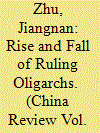

|
|
|
|
|
| Summary/Abstract |
A new term, “political corruption,” emerged in the Chinese Communist Party discourse during President Xi Jinping’s corruption crackdown. To understand why this type of corruption is particularly unacceptable to the Party, I apply Winters’s theory of oligarchy to encapsulate a group of Chinese high-level political elites who leveraged their political power for massive material wealth through corrupt measures. I argue that these oligarchs had to defend both wealth and political power in the context of the single-party authoritarian regime. Their intent and capacity for the double defense, however, can pose a threat to the regime and pave the way to their downfall. Two high-profile cases further show how different career tracks provide power resources politicians can use to ascend to the level of oligarchs. This research draws attention to concept adaptation in corruption crackdowns in China and enriches oligarchical theory by signifying the logic of double defense for using political power as the steppingstone to oligarchic power.
|
|
|
|
|
|
|
|
|
|
|
|
|
|
|
|
| 20 |
ID:
083123
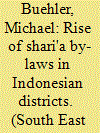

|
|
|
|
|
| Publication |
2008.
|
| Summary/Abstract |
A rising number of districts in Indonesia have adopted shari'a by-laws in recent years. This article shows that this development has to be situated in the context of institutional change. Shari'a by-laws allow regents to open up new revenue streams. These revenues are then used to consolidate political power
|
|
|
|
|
|
|
|
|
|
|
|
|
|
|
|
|
|
|
|
|